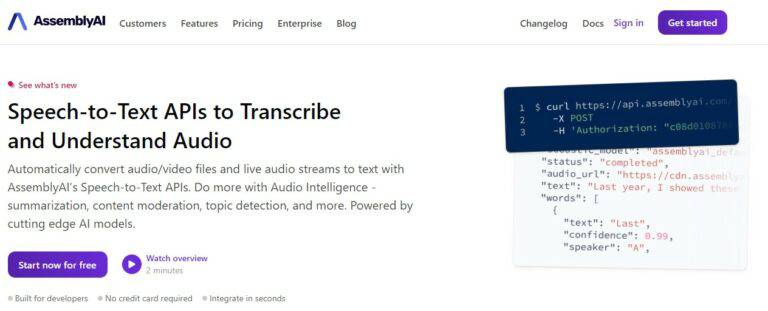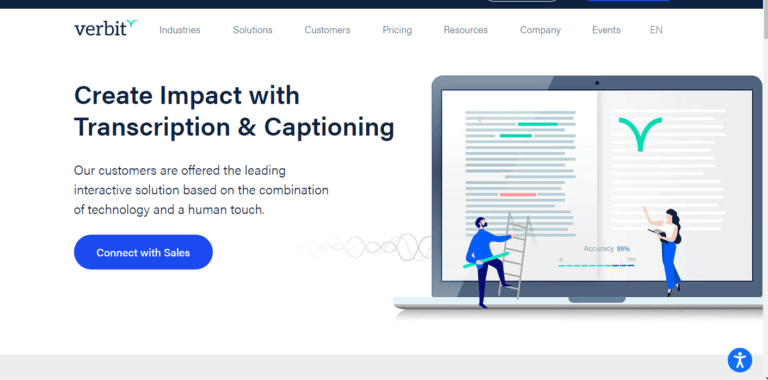
Verbit
Founded Year
2016Stage
Secondary Market | AliveTotal Raised
$532MRevenue
$0000Mosaic Score The Mosaic Score is an algorithm that measures the overall financial health and market potential of private companies.
-20 points in the past 30 days
About Verbit
Verbit specializes in artificial intelligence-based transcription and captioning services. The company offers a range of services including live captioning, transcription, video and audio transcription, closed captioning, audio description, translation, and legal transcription. It primarily serves sectors such as corporate and general business, media production, education, digital and online learning, and legal. It was founded in 2016 and is based in New York, New York.
Loading...
ESPs containing Verbit
The ESP matrix leverages data and analyst insight to identify and rank leading companies in a given technology landscape.
The generative AI — call transcript analytics market focuses on analyzing and using unstructured audio from phone calls, video meetings, conference calls, sales interactions, support interactions, and videos. This market offers solutions that can transcribe audio accurately to gain insights into a business' customers and provide better customer experiences in terms of voice assistants, sales and s…
Verbit named as Highflier among 13 other companies, including Speechmatics, AppTek, and Chorus.ai.
Verbit's Products & Differentiators
Live captioning & real-time transcription
Live captioning your Zoom calls offers more equitable viewing for individuals with disabilities and others by making live videos, courses, trainings, meetings and events accessible. With leading AI real time captioning, transcription and CART services, Verbit offers live captions and transcripts to all viewers seamlessly.
Loading...
Research containing Verbit
Get data-driven expert analysis from the CB Insights Intelligence Unit.
CB Insights Intelligence Analysts have mentioned Verbit in 2 CB Insights research briefs, most recently on Mar 8, 2022.
Expert Collections containing Verbit
Expert Collections are analyst-curated lists that highlight the companies you need to know in the most important technology spaces.
Verbit is included in 2 Expert Collections, including Unicorns- Billion Dollar Startups.
Unicorns- Billion Dollar Startups
1,244 items
Artificial Intelligence
14,769 items
Companies developing artificial intelligence solutions, including cross-industry applications, industry-specific products, and AI infrastructure solutions.
Verbit Patents
Verbit has filed 13 patents.
The 3 most popular patent topics include:
- computational linguistics
- speech recognition
- natural language processing

Application Date | Grant Date | Title | Related Topics | Status |
|---|---|---|---|---|
10/7/2019 | 10/26/2021 | Speech recognition, Computational linguistics, Artificial intelligence applications, Natural language processing, Phonetics | Grant |
Application Date | 10/7/2019 |
|---|---|
Grant Date | 10/26/2021 |
Title | |
Related Topics | Speech recognition, Computational linguistics, Artificial intelligence applications, Natural language processing, Phonetics |
Status | Grant |
Latest Verbit News
Sep 13, 2024
Here’s what it may mean for the future of infrastructure. A closeup of a smiling young woman in headphones using laptop. Overlaying the image are several holographic-like icons and elements, suggesting the concept of AI and chatbot technology. Artificial intelligence systems are digital, but they are very much dependent on the physical world. As demand for this virtual technology surges, tech companies that want to keep advancing AI face a much more tangible problem: sourcing enough electricity. AI systems, particularly large language models like ChatGPT, are energy-intensive due to their immense computational needs. The leading AI models have taken in massive amounts of publicly available text on the internet. Processing the data and trying to draw insights from it both require a ton of electricity. While exact figures are not publicly available, one estimate suggests that training GPT-4 took 50 gigawatt-hours to train. The typical American household uses about 10,800 kilowatt-hours of electricity annually. This means that training GPT-4 used enough electricity to power some 4,500 households for a year. Meanwhile, in a 2024 report, Goldman Sachs estimated that each ChatGPT query uses 10 times the electricity of a single Google search . As AI systems continue to develop and reach more people, electricity demand is likely to increase with it. Verbit examined analyst reports to see how AI’s growth will change the future of infrastructure. Verbit Demand for electricity is expected to grow A line chart showing how electricity consumption from data centers is expected to grow in the U.S. How much electricity will AI’s growth consume? According to the Goldman Sachs report, data centers—essential for running AI models—could account for 8% of total U.S. power consumption by 2030, up from 3% in 2022. Similarly, the Boston Consulting Group estimates that data centers will increase their share of consumption to between 6% and 7.5% by 2030 , compared to 2.5% in 2022. Prior to the AI boom, demand for electricity in America had been stagnant since the mid-2000s. The sudden increase in energy consumption from data centers is straining the country’s aging infrastructure. McKinsey estimates that in order to keep up with the sudden increase in demand for electricity, utility companies will have to invest $50 billion in energy generation alone. Some tech companies are already striking deals to secure the electricity they need. Microsoft recently signed a reported $10 billion deal with Brookfield Asset Management. Brookfield will provide the tech giant with an additional 10.5 gigawatts of renewable energy between 2026 and 2030 to help power data centers in America and Europe. Last year, Microsoft signed the world’s first deal for fusion energy with Helion Energy . The nuclear provider, also backed by OpenAI’s CEO Sam Altman, is set to start delivering electricity to Microsoft in 2028. katjen // Shutterstock Multiple racks filled with hardware devices in a blue lit room. The potential electricity scarcity points to growth in alternative energy sources. The Bureau of Labor Statistics projects that wind turbine technicians will be the fastest-growing occupation through 2032, with solar panel installers ranking among the top 20. Goldman Sachs also notes that new data centers will require the construction of additional natural gas pipelines. If utility companies secure regulatory approval to build the power capacity and infrastructure needed by tech companies, this could result in a significant construction boom. Tech companies can produce software with programmers and laptops, but building physical infrastructure offers a different set of challenges. Unlike digital products, power plants, transmission lines, and data centers require vast tracts of land, complex permitting processes, and oftentimes, years of construction. They face regulatory hurdles, environmental assessments, and even local opposition . They also require specialized workers who will have their hands full. An energy shortage could have major implications for businesses and consumers. The AI boom coincides with a surge in demand for electricity across multiple industries, including manufacturing and electric vehicles. Without ample electricity infrastructure, companies would be limited in how much technology they could deploy, and this scarcity would raise prices for consumers. Households could also face higher electricity prices, especially if they live in an area with lots of data centers, such as Northern Virginia. Power companies could implement dynamic pricing, charging more for electricity during peak hours. The AI boom could also impact the environment: Although their servers are increasingly being powered by renewable energy, Goldman Sachs projects that carbon dioxide emissions from data centers could double by 2030. Goldman Sachs estimates that nearly 40% of the increase in energy demand in the United States will come from data centers. Even a revolutionary digital technology like AI has a profound impact on the physical world. Story editing by Alizah Salario. Additional editing by Kelly Glass. Copy editing by Tim Bruns. This story originally appeared on Verbit and was produced and distributed in partnership with Stacker Studio.
Verbit Frequently Asked Questions (FAQ)
When was Verbit founded?
Verbit was founded in 2016.
Where is Verbit's headquarters?
Verbit's headquarters is located at 169 Madison Avenue, New York.
What is Verbit's latest funding round?
Verbit's latest funding round is Secondary Market.
How much did Verbit raise?
Verbit raised a total of $532M.
Who are the investors of Verbit?
Investors of Verbit include CrossWork, Sapphire Ventures, Vertex Growth, More Capital, Samsung NEXT and 22 more.
Who are Verbit's competitors?
Competitors of Verbit include Sherpany, Ava, Otter.ai, Trint, AI-Media and 7 more.
What products does Verbit offer?
Verbit's products include Live captioning & real-time transcription and 4 more.
Loading...
Compare Verbit to Competitors

Otter.ai specializes in AI-powered note-taking and transcription services for various sectors. The company offers an AI Meeting Assistant that provides real-time transcription, automated meeting summaries, and action item extraction. Otter.ai primarily serves sectors such as business, sales, education, and media. Otter.ai was formerly known as AISense Inc. It was founded in 2016 and is based in Mountain View, California.
Rev.ai is a company that specializes in speech recognition technology in the artificial intelligence industry. The company offers services such as converting audio or video files into machine-generated transcripts, real-time transcription of streamed audio or video, human-generated transcripts for high accuracy, and insights like language identification, topic extraction, and sentiment analysis from text. The company primarily caters to sectors that require transcription services, such as media, customer service, and research. Rev.ai was formerly known as Rev.com. It was founded in 2010 and is based in San Francisco, California.
3Play Media provides closed captioning, transcription, and audio descriptions to customers in higher education, enterprise, entertainment, and government. It simplifies the process of making videos accessible through APIs, integrations with video players and platforms, plugins, and an online account system. The company was founded in 2007 and is based in Boston, Massachusetts.
Sovoro specializes in AI-based real-time transcription services within the technology sector. The company offers a platform that converts speech into text with high accuracy, supports various devices, and allows for editing and sharing of transcripts. Sovoro's products are designed to facilitate communication for individuals and organizations through text-to-speech and augmentative and alternative communication features. It was founded in 2017 and is based in Seongdong-gu, South Korea.

Trint is a company that focuses on providing AI-powered transcription and translation services, operating in the software as a service (SaaS) industry. The company offers a platform that transcribes audio and video files into text, allowing for editing and collaboration in a single workflow. This service is primarily used by sectors that require transcription and translation of audio and video content, such as media and research industries. It was founded in 2014 and is based in London, England.
Myna is a company that specializes in the technology sector, with a focus on meeting recording software. The company's main product is a software that records and organizes information from virtual meetings, turning them into searchable scripts, video, and audio records. This service is primarily used by businesses for better record-keeping and data management. It is based in London, England.
Loading...

